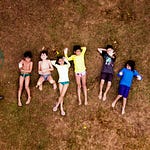Because one size does not fit all. Today we discuss how to find alternative structures and shape your own with writers Christopher Boucher and Ethan Gilsdorf. Referenced in today’s podcast: Matthew Salesses Craft in the Real World and Jane Allison’s Meander, Spiral, Explode. Also, the traditional plot structure in Chinese, Japanese, and Korean literature known as Kishōtenketsu. Read more at https://bookriot.com/kishotenketsu/
Christopher Boucher received his MFA in Creative Writing from Syracuse University in 2002. Chris is the author of the novels How to Keep Your Volkswagen Alive, Golden Delicious and Big Giant Floating Head (a 2019 Massachusetts Book Award Finalist). He’s also the editor of Jonathan Lethem's More Alive and Less Lonely: On Books and Writers. He's an Associate Professor of the Practice of English at Boston College and the managing editor of Post Road Magazine.
Ethan Gilsdorf is a journalist, memoirist, essayist, critic, poet, teacher, and the author of the award-winning memoir Fantasy Freaks and Gaming Geeks. His writing has appeared in the New York Times, Washington Post, Esquire, Boston Globe, Wired, Salon, National Geographic, Poetry, The Southern Review, North American Review, among other publications, and twice was named "Notable" by The Best American Essays. He teaches creative writing at GrubStreet in Boston, where he leads the 9-month Essay Incubator program; he also leads writing workshops for non-profit social justice organizations. He presented the TEDx talk "Why Dungeons & Dragons is Good for You (In Real Life)” and has appeared on NPR, The Discovery Channel, PBS, CBC, BBC; and in the documentary Revenge of the Geeks. More info: ethangilsdorf.com, Twitter @ethanfreak.
For the short fairy tale, “The Rosebud,” that I promised at the end of the show as an example of “intuitive logic,” which breaks from our usual Cause & Effect expectations, check out Kate Bernheimer’s essay on fairytales: https://www.academia.edu/3174316/_Fairy_Tale_is_Form_Form_is_Fairy_Tale_
The story itself along with other wonderful translations of fairy tales, can be found here: https://i-share-uiu.primo.exlibrisgroup.com/discovery/fulldisplay?vid=01CARLI_UIU:CARLI_UIU&search_scope=MyInstitution&tab=LibraryCatalog&docid=alma9931305812205899&context=L













Share this post